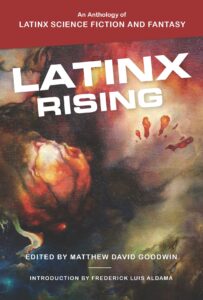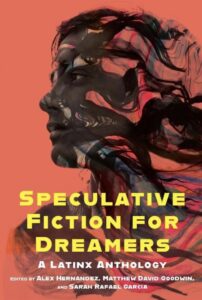Are there any futures written out there in which my communities survive? This question provoked a conflict of distress and hope within me, launching my research on contemporary speculative fiction. It fueled my study on published Latina and LatinX writers, mentored by Dr. Claire Fox at the University of Iowa’s English department. It drove everything that I read last semester, from the Latinx Rising anthology (OSU Press 2020) to A People’s Future of the United States (One World 2019) to LatinX (UMN Press 2020). It still reverberates deep in my soul.
Back in November, I reached out to Matthew David Goodwin, editor of Latinx Rising, for an interview. I couldn’t believe that the person who called for the first LatinX science fiction and fantasy (SFF) anthology was a professor at the University of Puerto Rico in Cayey. ¡Qué mundo pequeño! In fact, it was my first semester in three years where I wouldn’t be traveling to Iowa and would instead be staying home in Puerto Rico to finish my undergraduate studies. I could not bear the coincidence without taking the opportunity to chat with Goodwin, so I asked a common friend for an introduction.
Pandemic precautions made me write a long introductory email explaining my interests in gender and sexuality within Latinx Rising, and inviting Goodwin to a Zoom interview. Having recently “diasporaed out” to New Jersey, his answer was an encouraging “Your topic is perfect! Just let me know when!” Three days after our correspondence, we virtually met. Goodwin received my call with an eager disposition, feedback on my writing, colorful SFF art in the background, and sporadic cameos from his toddler—a real treat!

Per two of my Latina professors’ advice, I began my speculative journey over the summer, reading Parable of the Sower (Four Walls 1993) by the illustrious Octavia E. Butler. It quickly became one of my favorite books, which popped up again when I read Catherine S. Ramírez’s “Afrofuturism/Chicanafuturism” later in the semester. Studying how Ramírez picked up creations by Butler, Gloria Anzaldúa, and Marion C. Martinez to theorize a futurism particular to Mexican Americans, blew. My. Mind. So after discussing some of the stories in Latinx Rising, Goodwin and I took off pondering on the usefulness of this framework without, of course, coming to a clear answer.
As we jump in, I want to clarify how I use the term LatinX, a currently evolving and far from perfect name. I generally refer to the ever-changing group of Latin American and Caribbean subjects living in diaspora. I also do not intend to undermine anyone’s humanity by switching out the expected suffixes “o” or “a” for “X”; or to assert a ‘new label’ when Latin American and Caribbean migrants and descendants have existed for centuries, and when the undefinable ‘x’ has long been in use as a binary disruptor. Rather, I want to recognize the creative individualities as well as urgent collectives that this group can ideally represent. Latina/o are still relevant terms—mostly gender- and location-specific, like how Hispanic highlights the Spanish language presence or how Chicanx/a/o emphasize Mexican-American nuances. But more than a definable group, it has helped me to reframe LatinX as a diasporic phenomenon, reconstructed daily by generations of people across the globe. Moreover, LatinX invites the conjunction of multiple identities: nationalities and citizenships, races and ethnicities, genders and sexualities, languages and dialects … However, we must recognize that within these intersecting layers often resides ardent supremacy—a foundation upon which the term’s problematic usage presides.

Latinx Rising, a SFF anthology edited by Matthew David Goodwin.
With that in mind, let’s proceed …
To my question about whether a wider ‘LatinXfuturism’ lens seems plausible, Goodwin considers himself “on the more critical side” of such categorizations and framing. Futurism, Goodwin abounded, was an art movement in early 20th century Italy that glorified technology. Later on, the same decade Butler released Parable, Afrofuturism was coined by Mark Dery and further developed by Alondra Nelson to address the African diaspora’s relationship with technology. Now, we have more nuanced streams, like Dr. Nnedi Okorafor’s Africanfuturism and the aforementioned Chicanafuturism. Plus, there’s the neutral act of thinking about the future, which has, dare I say, always existed.
Recognizing the benefits and challenges of playing around with the term “futurism,” Goodwin reflects: “I think it’s worthwhile having those categories to put different things together … and see how they’re overlapping … and sort of ignore the genres like science fiction, fantasy, all that stuff. It’s useful for that. But at the end of the day, that framework is worth examining as well. And are there other ones that would be more helpful? … Should we adopt this framework: ethnic group-, racial group-futurism? … I guess there’s different types of futurisms.”
The work of contemporary futurist writers partially resonates with exactly that: reclaiming dominant concepts that frame imaginations of the future, to fit their experiences where they haven’t been imagined or centered before—regardless of genre. Yet, SFF and most genres are historically white, heterosexual, and male; only in the past few years have we seen Black, Indigenous, and People of Color (BIPOC) and women, trans, and nonbinary folk take up significant space within any mainstream canon. Otherwise, we are written as the Other—and even with this alien figure, the X, explored in scholarship and fiction alike, there is much left to be deconstructed and decolonized.
BIPOC are and should continue focusing on ourselves, instead of negotiating with the mainstream. Nevertheless, BIPOC are and should continue radicalizing SFF. Not only has the legitimacy of writing about science, technology, and the future been whitewashed, but supremacists also use these same SFF tools to imagine their extreme versions of the future. Above all, I learned from Afrofuturism that futurism can become a practice in personal and communal survival, in imagining possible futures for those existing in the margins of predominant history and culture. Butler’s Parable, for instance, unflinchingly exposes a white minority’s takeover of apocalyptic California as corporations enslaving workers of color, monopolizing natural resources, and ignoring a health crisis. Sound familiar? However vague or confident it may feel, a response like that of protagonist Lauren Olamina is something we can actively strive for: an informed vision of tomorrow prepares us better for the change that will undoubtedly come, thus increasing our chances of survival.
For Goodwin as well as Ramírez, a crucial aspect within the possibility of imagining things better lies on the basic need for conversation across futurisms. “I want to expand that dialogue,” stresses Goodwin, “because I think we all have interesting things to say to each other.” Observing a trend myself of the theory (mostly by Chicana/o writers) grounding LatinX speculative arts in history and economics, I followed up with a question on what might still be under-explored within this expansive field. In fiction, Goodwin sees alternative utopias (net positive futures) as a “gentle intervention” to cut through the abundance of dystopias (net negative futures): “Is it possible to imagine things better?” In scholarly work, he concurs, “A lot of these key works are about gender and sexuality and they have not been theorized or examined—together, especially … I’m thinking of Samuel Delany and Octavia Butler, both of whom used science fiction to really rip out the binary system and just explore all these third ways and fourth ways of expanding out the possibilities in that. And that allows you to imagine it and see it. That’s one of the powers of speculative fiction: it enables you to see what may be only in theory in action and, in someways, normalized. And it might be in an alien or a robot, but it’s there.”

From my continuously evolving research and position as a Puerto Rican woman, I would add that there is still only a handful of Caribbean, Afro-descendant, and trans authors featured within this group of texts, in both mainstream fiction and theory. When Goodwin described the contemporary LatinX SFF community as “threads of connection throughout the country [U.S.],” it felt urgent to me to highlight artists Yomaira C. Figueroa-Vásquez and Alán Pelaez Lopez, whom are currently expanding the definition of LatinX and the assumption that it is created only in the U.S. (rather than in multiple diasporas). Some of the best art is being done by queer and Black and Indigenous creatives, and there is simply no LatinX without them.
Significantly, Goodwin noted the recent push for Afrofuturist and LatinX speculative stories over the last five years, right before I could ask him to ruminate on why. Recognizing the extent of our collective knowledge and speculative capabilities, he nonetheless illuminated some of the intersecting causes people have floated around: 1) real socioeconomic barriers to LatinX getting into science and thus science fiction, 2) a deep nationalism and racism involved in publishing barriers which pigeonholes LatinX writers in the magical realism or urban mystery genres, and 3) the reactionary white supremacist movement.

Speculative Fiction for Dreamers, an anthology for young adults edited by Goodwin, Alex Hernandez, and Sarah Rafael García, forthcoming from Ohio State University Press.
For a case in point, Goodwin recalled about his experience teaching at UPR Cayey: “A lot of the students want to be scientists, doctors, medical technologists … They really connected to those kinds of characters in LatinX science fiction, which do not appear basically anywhere else in LatinX literature. It’s a small little thing in some ways. Being able to imagine yourself in the profession that you want to be in, I think is really powerful … And students really had trouble getting out of the dystopian mindset, which is really the dominant cultural expression.” Furthermore, Goodwin referenced influential speculative works that grapple critically with the past—Cherríe Moraga’s The Hungry Woman (West End Press 1995), Ryan Coogler’s Black Panther (2018), and HBO’s Watchmen (2019)—to point out, “That’s a real incomplete answer, but … speculative fiction can also give a framework for thinking about history.”
Not everything BIPOC create has to rise to the bait of supremacist futures. Nevertheless, everything should be connected so that we can celebrate our victories and support our pains together. As Butler’s Parable taught me, we must actively prepare ourselves for the worst, but we can never give up on the best that change has in store for us. Goodwin himself wrapped up our conversation with a most fitting: “My future is unknown at this point, I’m not sure where things are going.” I’m not sure either, nor have I come close to answering my original question. But as daunting as this ever-changing world may seem, I know I have my dreams, my words, my actions. I can manifest positive futures for my communities and myself as self-fulfilling prophecies, like many people before me have done and as many to come will do. Whether that takes the form of scholarly writing, creative arts, communal interactions, everyday thoughts—will you join me?
Excited? Check these out: https://www.latinospeculativefiction.com/speculativefictionfordreamers http://www.alanpelaez.com/afro-latinx-anthology/ https://zoraidacordova.com/books/reclaim-the-stars/
 Melissa Martínez-Raga (ella/she/they) is a writer and bookworm puertorriqueña. She is an editor associated with magazines Fools and Spanglish Voces, and assistant to upcoming author Xochitl Gonzalez. She is currently pursuing an English B.A. at the University of Iowa, where she is also exploring her interests in Literary Theory and Interdisciplinary Studies, particularly Latina/o/x Studies and Gender, Women’s, and Sexuality Studies. Find her words in Fools Magazine and El BeiSMan.
Melissa Martínez-Raga (ella/she/they) is a writer and bookworm puertorriqueña. She is an editor associated with magazines Fools and Spanglish Voces, and assistant to upcoming author Xochitl Gonzalez. She is currently pursuing an English B.A. at the University of Iowa, where she is also exploring her interests in Literary Theory and Interdisciplinary Studies, particularly Latina/o/x Studies and Gender, Women’s, and Sexuality Studies. Find her words in Fools Magazine and El BeiSMan.





